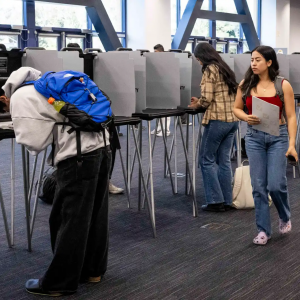Sitting in her daughter’s room, Alabama resident 35-year-old Kimberly expressed fears that time was running out for her to complete her family. In an ABC News interview, she lined up all of her medications and explained it was her fourth and final IVF treatment. Yet she was told to wait – a reality that many Alabama women experienced when the Alabama Supreme Court decided that embryos are considered children.
In the weeks since Alabama’s Supreme Court decision on February 16th, a growing consensus of concern has swept the country that restrictions on fertility would spread like wildfire. Alabama’s court – comprised of 9 members, with only 2 female judges – ruled 8 to 1 in their decision which rocked the state. The concurring opinion presented by Chief Justice Tom Parker invoked heavy implications and influence from scripture, arguing that the people of Alabama have embraced the notion that “even before birth, all human beings bear the image of God, and their lives cannot be destroyed without effacing his glory.” In the following weeks, access to healthcare for women and families has been systematically uprooted and redefined in Alabama.
After flying out of state to receive IVF treatment, Gabrielle Goidel told CNN she didn’t even feel like returning to Alabama. In a similar situation to Kimberly, Gabrielle received a phone call from her fertility clinic stating they would be closing and that she would have to wait. She was afraid the decision would risk her potential pregnancies and the careers of healthcare professionals who worked with her. The ruling also created unanswered questions about the non-genetically viable eggs. Kimberly and Gabrielle are just one of many Alabama families that were forced to make compromising decisions on their fertility treatments.
As a result of the ruling – which echoes the fears raised by the overturning of Roe, clinics performing IVF treatments made the difficult decision to halt treatment temporarily. Clinics across the state closed their doors when faced with the growing uncertainty resulting from this ruling. Alabama doctors and advocates raised concerns about professional licenses being revoked, pointing at the possibility of lawsuits that could come from the ruling. Gail Daidy, a senior staff member who works at the Reproductive Rights Center, told NBC News there’s a concern of civil liability and negligence – both of which raise fears of healthcare professionals losing their business or their license. On top of these concerns, clinics have stated that the necessary steps to protect IVF treatment, such as insurance to defend against wrongful death suits, would be too high.
Meanwhile, individuals across the state are forced to wait on beginning their families – which for some have been years in the making. While IVF treatment is not necessarily a reality that all Americans will experience, Alabama’s decision raises concerns about the general well-being and privacy of women across the country. Professionals across the state of Alabama worry that rulings such as these would further ‘set the stage’ for more restrictive reproductive care practices in the future.
The IVF process can take months – even years for some, and the treatment does not necessarily result in a healthy pregnancy. According to Planned Parenthood, a single IVF treatment cycle can cost up to 15 thousand dollars alone. IVF is rarely covered by insurance and usually requires families to travel out of their city to find a clinic that can support them, with less than ten clinics in the state. For the families that can afford the procedure, it takes an enormous amount of time and emotional energy to go through with IVF – a luxury that most Americans do not possess.
Even if the ruling is based in Alabama alone – the case has implications for nationwide changes to healthcare. Healthcare professionals warned of similar fallbacks that happened after the overturning of Roe, believing that the new ruling would hinder fertility treatment rather than protect them. According to the New York Times, healthcare professionals are worried about the possibility of civil and criminal liability when handling embryos – now considered children under Alabama law. When the ruling first came out, dozens of families received the devastating news that they would have to wait.
Fertility treatment is a privileged access to healthcare – especially when the families getting these procedures spend thousands of dollars on travel, medication, and appointments. Not every family can afford these luxuries of healthcare, but that doesn’t mean lawmakers and judges should be the ones to decide how and when it can happen. While IVF treatment is not an experience shared by all American women, the broader implications of Alabama’s ruling can lead to a steady decline in healthcare and privacy.
After the overturn of Roe, healthcare professionals have expressed concern for patients’ right to privacy. Professionals and citizens alike have continued to discuss how these new sets of rulings from both state and federal courts are encroaching on individual privacy. The loss of protection of private medical matters, specifically for women, can pave the way for more restrictive rulings that affect more than individual women and families. American’s privacy goes beyond just healthcare decisions – but extends to our most intimate and life-changing choices. Who they marry, the decision to have children, how they’re raised, and now the decision on when to have children – are all choices that are protected by our privacy.
When these intimate moments and decisions are scrutinized and given arbitrary legal definitions, Americans have every right to be concerned for the future of not only their families – but also the nation. We shouldn’t have to pick and choose between our rights, especially when it relates to our autonomy. Americans, regardless of their gender, sexual orientation, or political affiliation, should be granted the same respect and access to healthcare. Alabama’s IVF rulings are a direct undermining of these rights, and it was obvious that Americans would be rightfully upset and outraged by the decision.
The issue hit every American television and cable news network during the State of the Union address, where President Biden criticized Alabama’s ruling for affecting American families. “History is watching another assault on freedom,” Biden said to America, “to my friends across the aisle, don’t keep this waiting any longer – guarantee the right to IVF.”
Even the governor of Alabama, Kay Ivey – a longtime conservative who supported some of the most constrictive abortion bans, stated that she wanted to protect IVF treatment. When legislators such as Tim Melson decided to clarify the decision with bills that state embryos are only children after they have been implanted into a uterus – Americans were rightfully upset. Why should we consider these questions only after extremist court rulings take effect? Why is it that the individuals with the least amount of stake in these issues are always the ones who make our final decisions?
While the following weeks have led to some fertility clinics resuming work, questions remain about who and how this ruling will affect the larger concern of healthcare. There is a genuine concern growing among individuals that the Alabama case is not out of the ordinary – but instead an inevitable setback for women following the Dobbs decision. America watched as 21 states placed restrictions or outright bans on abortion. We continue to see legislation that is aimed at infiltrating American’s privacy and integrity. The Alabama court ruling is not different – it invades and restricts women’s access to healthcare based on terms that they never agreed to.
The main fear from the case of Alabama is not whether fertility treatments are restricted – but rather if Americans will continue to experience a general decline and restriction in their access to healthcare. The growing risks that are associated with access to health care threaten when and how we receive medical treatment – something that Americans shouldn’t have to worry about. We should be critical of the most fundamental legal decisions in America, and the Alabama IVF ruling showcases the snowball effect of rights that are stripped from us.
Featured Image Source: NBC News






Comments are closed.